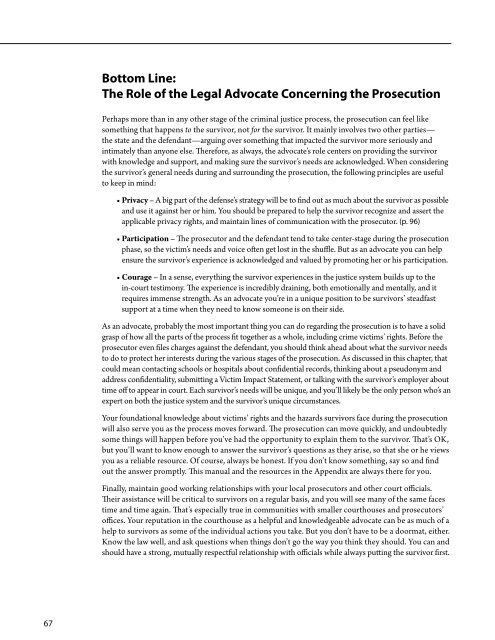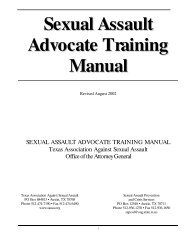Sexual aSSault LEGAL ADVOCACY MANUAL - Texas Association ...
Sexual aSSault LEGAL ADVOCACY MANUAL - Texas Association ...
Sexual aSSault LEGAL ADVOCACY MANUAL - Texas Association ...
You also want an ePaper? Increase the reach of your titles
YUMPU automatically turns print PDFs into web optimized ePapers that Google loves.
Bottom Line:<br />
The Role of the Legal Advocate Concerning the Prosecution<br />
Perhaps more than in any other stage of the criminal justice process, the prosecution can feel like<br />
something that happens to the survivor, not for the survivor. It mainly involves two other parties—<br />
the state and the defendant—arguing over something that impacted the survivor more seriously and<br />
intimately than anyone else. Therefore, as always, the advocate’s role centers on providing the survivor<br />
with knowledge and support, and making sure the survivor’s needs are acknowledged. When considering<br />
the survivor’s general needs during and surrounding the prosecution, the following principles are useful<br />
to keep in mind:<br />
• Privacy – A big part of the defense’s strategy will be to find out as much about the survivor as possible<br />
and use it against her or him. You should be prepared to help the survivor recognize and assert the<br />
applicable privacy rights, and maintain lines of communication with the prosecutor. (p. 96)<br />
• Participation – The prosecutor and the defendant tend to take center-stage during the prosecution<br />
phase, so the victim’s needs and voice often get lost in the shuffle. But as an advocate you can help<br />
ensure the survivor’s experience is acknowledged and valued by promoting her or his participation.<br />
• Courage – In a sense, everything the survivor experiences in the justice system builds up to the<br />
in-court testimony. The experience is incredibly draining, both emotionally and mentally, and it<br />
requires immense strength. As an advocate you’re in a unique position to be survivors’ steadfast<br />
support at a time when they need to know someone is on their side.<br />
As an advocate, probably the most important thing you can do regarding the prosecution is to have a solid<br />
grasp of how all the parts of the process fit together as a whole, including crime victims’ rights. Before the<br />
prosecutor even files charges against the defendant, you should think ahead about what the survivor needs<br />
to do to protect her interests during the various stages of the prosecution. As discussed in this chapter, that<br />
could mean contacting schools or hospitals about confidential records, thinking about a pseudonym and<br />
address confidentiality, submitting a Victim Impact Statement, or talking with the survivor’s employer about<br />
time off to appear in court. Each survivor’s needs will be unique, and you’ll likely be the only person who’s an<br />
expert on both the justice system and the survivor’s unique circumstances.<br />
Your foundational knowledge about victims’ rights and the hazards survivors face during the prosecution<br />
will also serve you as the process moves forward. The prosecution can move quickly, and undoubtedly<br />
some things will happen before you’ve had the opportunity to explain them to the survivor. That’s OK,<br />
but you’ll want to know enough to answer the survivor’s questions as they arise, so that she or he views<br />
you as a reliable resource. Of course, always be honest. If you don’t know something, say so and find<br />
out the answer promptly. This manual and the resources in the Appendix are always there for you.<br />
Finally, maintain good working relationships with your local prosecutors and other court officials.<br />
Their assistance will be critical to survivors on a regular basis, and you will see many of the same faces<br />
time and time again. That’s especially true in communities with smaller courthouses and prosecutors’<br />
offices. Your reputation in the courthouse as a helpful and knowledgeable advocate can be as much of a<br />
help to survivors as some of the individual actions you take. But you don’t have to be a doormat, either.<br />
Know the law well, and ask questions when things don’t go the way you think they should. You can and<br />
should have a strong, mutually respectful relationship with officials while always putting the survivor first.<br />
67
















